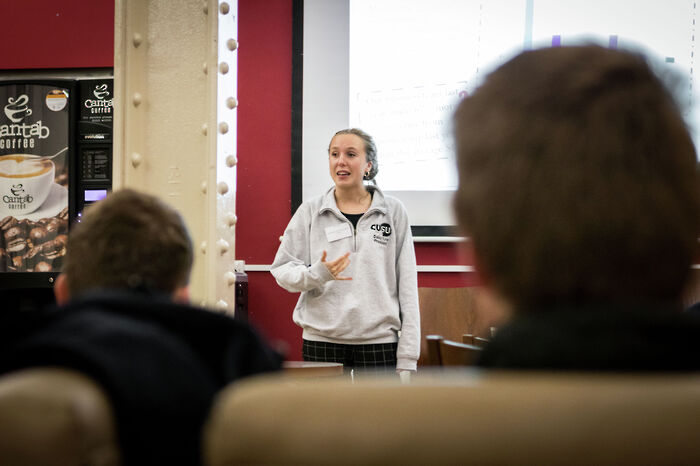Confusion abounds at third CUSU Council
Council struggled to come to a conclusion as to whether previous attendances had been high enough for votes to have been quorate

CUSU Council met for a brief and frustrating hour on Monday evening that resulted in the passing of two motions, while questions were raised about the legitimacy of votes at previous council meetings.
The meeting got off to an awkward start, as CUSU President Daisy Eyre struggled to answer a question from Varsity as to how quoracy (the number of votes required at Council for a motion to be legitimately passed) was defined.
In the CUSU constitution, co-written by Eyre, quoracy is defined as “a number present equal to or greater than three-fifths of the number of Affiliated Common Rooms provided the number of non-Executive Council Members present, i.e. Council Members other than those prescribed in D.6i.b), is greater than the number of Executive Committee Council Members present (as described in D.6i.b) ).”
The constitution is therefore ambiguous regarding whether the number of Affiliated Common Rooms means the total number of JCRs and MCRs affiliated with CUSU, which would number around 50, or the total number of voting members from the affiliated JCRs and MCRs, numbering around 150 (as each common room has three votes).
The former interpretation would mean a vote requires roughly 30 people to be in attendance, whereas with the latter it would be roughly 90.
Eyre initially appeared confused when asked for clarification, saying that she had not been given “any warning in advance of that question”. She went on to say that the wording was “open to interpretation”, and that there was “no actual particular reason it would be for me [Eyre] to decide”.
There was some discussion as to which interpretation should be followed, with CUSU Democratic Support Coordinator Alex Cicale suggesting that quorum should be understood as three-fifths of the total number of affiliated JCRs and MCRs (meaning three-fifths of roughly fifty). He said that if quorum were set any higher, most votes at previous councils, including on budgets, would be invalid. However, no formal decision was made as to which interpretation was correct.
Monday’s Council also saw Simon Percelay, head of CUSU LGBT+ campaign, put himself forward to be on the CUSU Finance Enquiry Committee, a group organised to scrutinise CUSU’s finances. Percelay noted that at present there was no one from the liberation campaigns on the committee, despite the campaigns having had their budget cut by £500 in the most recent budget.
Percelay was voted onto the committee, where he joins the already-elected Daisy Eyre, Connor MacDonald, Ryan Newman, and Angus Donald.
Two motions were also presented at Council, with Emrys Travis, the WomCam's disabilities officer, proposing a motion that the CUSU liberation campaigns be given more votes at Council. Travis argued that while each affiliated common room has three votes, each liberation campaign is only allocated one vote, despite representing caucuses of students much greater in number than any of the colleges.
Simon Percelay spoke out in support of the motion, saying “there have been important decisions made about campaigns in budgets recently”, and that the motion would give the liberation campaigns a stronger institutional voice. The motion was passed unanimously.
A motion to support rent campaigns in Cambridge, proposed by Angus Satow and seconded by Matt Kite, newly elected NUS delegate and CUSU Education Campaign’s Officer respectively, was also passed with strong support
 News / SU reluctantly registers controversial women’s soc18 December 2025
News / SU reluctantly registers controversial women’s soc18 December 2025 News / CUP announces funding scheme for under-represented academics19 December 2025
News / CUP announces funding scheme for under-represented academics19 December 2025 Features / Should I stay or should I go? Cambridge students and alumni reflect on how their memories stay with them15 December 2025
Features / Should I stay or should I go? Cambridge students and alumni reflect on how their memories stay with them15 December 2025 News / Cambridge welcomes UK rejoining the Erasmus scheme20 December 2025
News / Cambridge welcomes UK rejoining the Erasmus scheme20 December 2025 Science / ‘Women just get it more’: autoimmunity and the gender bias in research19 December 2025
Science / ‘Women just get it more’: autoimmunity and the gender bias in research19 December 2025










